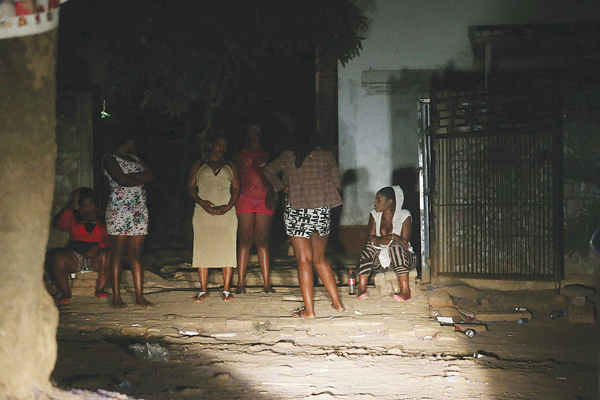
BY GUMISAI NYONI
THE catastrophic effects of the coronavirus (COVID-19) pandemic wreaking havoc across the globe have left many people financially crippled and impoverished.
While lockdown proclamations in many countries to stop the spread of COVID-19 are welcome and probably the only pragmatic option by governments, their ripple effects, especially in economically haemorrhaging nations, are threatening to further pauperise the less-privileged.
It has particularly made life for most commercial sex workers in Zimbabwe, whose job relies on clients on the streets and in public drinking places difficult as those outlets have been closed as part of the lockdown measures.
Tsitsi (not her real name), a mother of three daughters, residing in Epworth was among commercial sex workers who recently received food handouts from ROOTS, a non-governmental organisation actively involved in helping the needy during the lockdown period.
Tsitsi (32) said she had been fending for her family through sex work in Harare and when President Emmerson Mnangagwa first proclaimed the lockdown on March 30, her source of livelihood was hard hit.
While formally employed workers are working from home, her job requires outdoor marketing skills to get a catch. Restricted movements made it impossible for her to generate enough income for her family’s daily survival.
“It has been difficult to afford a basic meal since the lockdown started. At times we are forced to have just one meal per day,” Tsitsi told NewsDay.
- Chamisa under fire over US$120K donation
- Mavhunga puts DeMbare into Chibuku quarterfinals
- Pension funds bet on Cabora Bassa oilfields
- Councils defy govt fire tender directive
Keep Reading
“It’s a relief that today we received mealie-meal and cooking oil, among other basic commodities from ROOTS. These can help us to pull through this unbearable time,” she said.
Tsitsi was among several beneficiaries of handouts from ROOTS, who expressed gratitude for the benevolence the organisation is showing by intervening to lessen their burden.
ROOTS programmes manager, Sandra Mzama, said the food distribution initiative was inspired by the need to protect vulnerable groups in society including commercial sex workers from starvation and impoverishment resulting from the devastating effects of COVID-19.
“The lockdown has affected diverse groups. In a similar way, sex workers are also one such group of people in society who eke out a living from day-to-day activities. Even though their trade is frowned upon in some sections of the Zimbabwean society, they are still human beings who need food, shelter and clothing,” she said, adding that “these ladies have children who rely on them for survival; hence we saw it fit to give them food handouts to lessen their burden,” she said.
The organisation’s director, Beatrice Savadye said commercial sex workers were operating minimally because their clients were confined to their homes during the lockdown period.
“Their movement is restricted and if seen loitering by the police, they are beaten. Most hotels and pubs in which they operate from are also being raided. The few that have braved and risked going to their places of work have cited critical shortages of condoms. They have also indicated that they need sanitisers and gloves,” she said.
She said some commercial sex workers alleged that police officers were demanding sex to let them off the hook if they caught them violating lockdown restrictions.
“But considering they have children and dependants like any other person, which makes their situation dire, they desperately require safety nets,” she said.
The organisation has also targeted the elderly, helping them to put something on the table.
Savadye indicated that ROOTS assisted an 85-year-old Bindura woman who stays alone in a shack, while they did the same for another lady who takes care of her seven grandchildren.
In some developed countries, commercial sex workers rely on social media to engage clients and have virtual activities. However, in Zimbabwe, the situation is different.
COVID-19 poses a great threat to commercial sex workers whose profession involves contact and no social distancing, hence the need to be wary of other infections likely to brew as a result.
For instance, sex workers interviewed cited a shortage of condoms, a threat to the gains made so far in combating HIV and Aids infections. A rise in gender-based violence has also been recorded by organisations like Musasa Project during the lockdown period.
The COVID-19 pandemic has left several countries financially unstable, putting vulnerable societies at more risk than before. Tsitsi said she hoped the pandemic would subside for her to resume her normal life.











